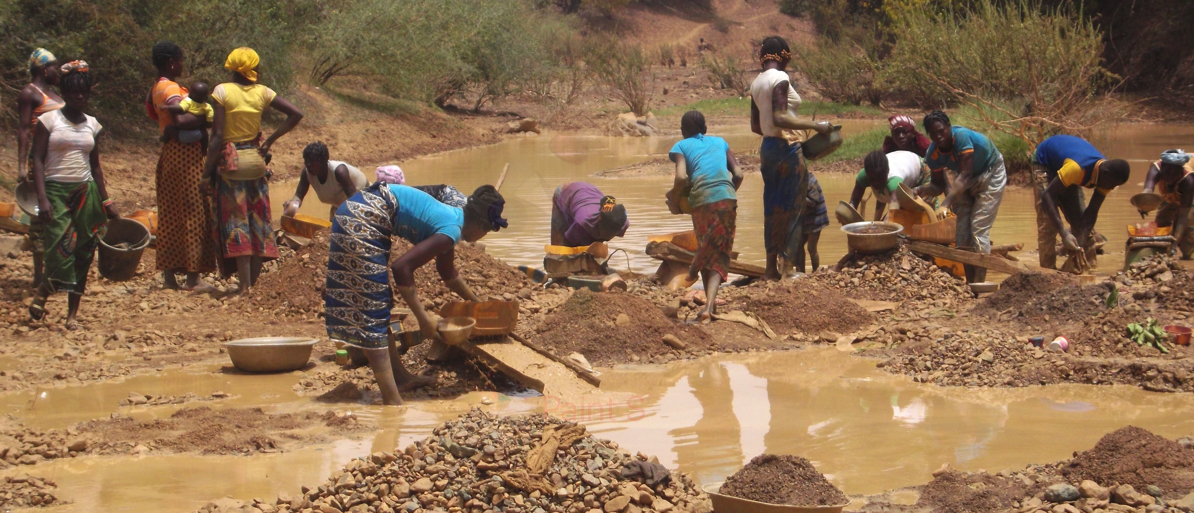
The Critical Case for Critical Minerals
Minerals once viewed as commodities now underpin clean energy, advanced computing, and modern defense.
Demand for copper, cobalt, lithium, and rare earth elements is set to accelerate through 2030 and beyond. At the same time, refining and processing remain highly concentrated, creating supply and geopolitical risk. Africa holds a large share of the world’s reserves and production capacity, yet local communities have captured limited long-term value from extraction.
The constraint is not geology—it is structure. Western capital faces thin margins and political exposure in large industrial projects, while vast volumes from artisanal and small-scale mining (ASM) remain informal and under-financed. Bridging this structural gap unlocks ethical, traceable supply at scale.
Industrial Mining
- Concentrated ownership
- Thin, contested margins
- Heightened geopolitical risk
Artisanal Mining
- ~45M workers globally
- Under-capitalized & informal
- Limited verification & finance
Sources
- USGS, Mineral Commodity Summaries (2024).
- IEA, Global Critical Minerals Outlook (2025).
- AP / S&P Global, World’s Supply of Critical Minerals Is Concentrated in Fewer Countries (May 2025).
- World Bank, A New Era of Renewal in Artisanal Mining (2025).
- RAID & Afrewatch, Beneath the Green (2024).
- Reuters, Nigeria to grant mining licences only to firms that process locally (2024).
Our Solution: The Reciprocity Model
Formal finance, transparent sourcing, and local value capture—turning artisanal mining into investable, traceable supply.
Meridini provides structured pre-financing to vetted artisanal and small-scale mining (ASM) cooperatives through auditable agreements. We link financing to clear provenance requirements and invest alongside trusted processors to sort, upgrade, and refine closer to the source. A defined Community Dividend channels a share of profits into education, infrastructure, healthcare, and entrepreneurship.
The result is a closed-loop system that converts fragmented output into reliable, verifiable flows—aligning investor returns with transparent governance and measurable local outcomes.
Sources
Structured Pre-Financing
Working capital advances against contracted tonnage
Verified Sourcing
Aligned to international due-diligence guidance.
Local Processing
Sorting, upgrading, and refining in-region.
Community Dividend
Funding education, health, and enterprise.
Independent Oversight
Controls, audits, and disclosures.
Reliable Supply
Traceable flows at institutional scale.
Why Now: A Strategic & Moral Imperative
The United States must secure critical minerals ethically, ensuring both supply chain resilience and shared prosperity with Africa.
The need for action is both strategic and moral. Strategically, the United States cannot afford to remain dependent on adversarial powers for materials foundational to batteries, semiconductors, and defense systems. Morally, the era of one-sided resource exploitation must give way to partnerships that respect sovereignty and deliver lasting development.
- African Source Criticality: 74% of the world’s mined cobalt came from the DRC; Mozambique was the #3 graphite producer in 2023 (~97,000 t); and 86% of U.S. manganese ore imports (2019–22) came from Gabon and South Africa.
- Chinese Refinery Dominance: China controls ~70% of global refining across 19 of 20 strategic minerals, including 90% of rare-earth refining and 60–70% of lithium and cobalt refining.
- Concentrated Supply: The top-three suppliers’ average global share of mining and refining hit 86% in 2024, up from ~82% in 2020.
- Demand Growing: Critical-minerals demand for clean energy nearly triples by 2030 and quadruples by 2040 to ~40 Mt in the IEA’s Net Zero Emissions scenario.
- Timing & Traceability: Global investment cycles are converging with Africa’s shift toward local beneficiation, while institutional buyers increasingly require auditable, traceable supply. Formalized, transparent flows are now the gateway to both compliance and capital.
Sources

The Meridini Approach
Our approach is built on the principle of reciprocity—ensuring that the benefits of Africa’s mineral wealth extend beyond extraction to create durable value for local communities. Instead of exporting raw materials under opaque deals, we secure transparent sourcing agreements and reinvest in in-region processing, generating jobs and capturing more value at the source.
This closed-loop system is governed by independent audits and public reporting, with a defined community dividend dedicated to schools, infrastructure, and small enterprise development. By pairing this reinvestment with training and technology transfer, we create the conditions for lasting capacity while delivering the secure, diversified mineral supply chains that global industries demand.
Pre-Finance
Working-capital advances against contracted tonnage with vetted artisanal partners.
Source
Transparent, traceable offtake agreements aligned with leading due-diligence standards.
Process
Local sorting, upgrading, and refining to capture more value in-region and create skilled jobs.
Govern
Independent audits, oversight committees, and quarterly transparency reporting.
Reinvest
Community dividend funding education, health, infrastructure, and small enterprise programs.
Secure Supply
Long-term, diversified, and verifiable mineral flows for responsible global partners.
Investor Proposition
Access to Critical Minerals
Direct exposure to secured offtake and midstream value-add through formalized artisanal and small-scale mining partnerships and in-region processing.
Risk-Mitigated, ESG-Aligned
Transparent governance, independent audits, and a defined community dividend align financial performance with measurable local outcomes and responsible practice.
Aligned with U.S. Supply Chain
Supports national resilience and friendly-shore partnerships through traceable flows and midstream capacity near the source.
Meridini offers a structured path to responsible growth — linking transparent finance and traceable supply to measurable community outcomes. Investors gain direct exposure to ethical production with institutional-grade oversight and governance.
Sources
- OECD, Due Diligence Guidance for Responsible Supply Chains of Minerals (ongoing).
- Responsible Minerals Initiative (RMI), Standards & Assurance (accessed 2025).
- EU Global Gateway, Lobito Corridor Flagship (2024).
- Cobalt Institute, Market Report (2024/2025).
